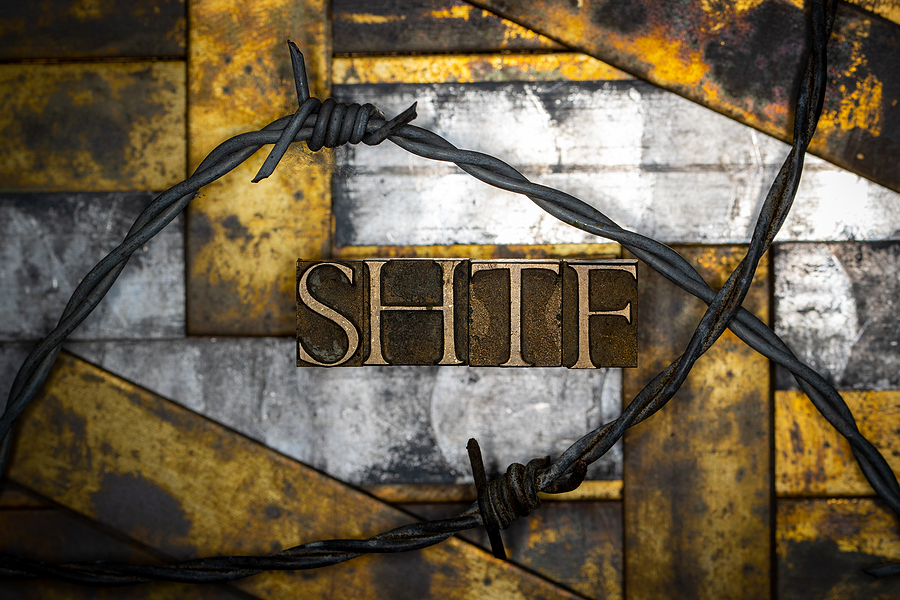
The evidence that there are already terrorists and terrorist sympathizers inside the borders of the United States is piling up and becoming harder and harder to ignore or downplay. In addition to tens of thousands of violent criminals deliberately released from prisons in South America and sent here (look, for example, at what is going on in Aurora, Colorado) we have more intelligence that not only are terror groups planning attacks in the USA, their people are already here.
On “The Resilient Show,” host Chad Robichaux recently interviewed a CIA targeter, Sarah Adams. Ms. Adams didn’t hesitate to confirm that not only are Al Qaeda and ISIS planning mass casualty attacks in the US along the lines of the October 7th attack on Israel, they’ve already pushed their operatives across the southern border.
Problems with No Solutions?
Media types and pundits will occasionally report threats to the United States and the people of our nation. The information that they present is verifiable and true, but, rarely if ever, are there any positive or actionable solutions offered.
During his interview with Sarah Adam, Mr. Robichaux asked her what she thought the average person should be doing in light of the fact that terror attacks in the USA are not an “if” but a “when.” Sadly, in my humble opinion, the answers that the two came up with were rather generic and not purposeful or deliberate enough. Advice like “get some first aid training” or “plan like you would for a hurricane,” appear to be reasonable pieces of advice, but can’t we do better than that?
You Know You Should Be Doing Something, But What?
Let’s face facts. We live in a nation populated by two large factions. Faction One is too wrapped up in whichever media distraction is placed in front of them or has their head stuck in their phones scrolling TikTok to realize or care about actual threats to the nation. When attacks do materialize, these people will act shocked and horrified and ask, “How could this have happened?”
Faction Two, of which I would include many readers here, have been paying attention to the warning signs. Despite the fact that it’s ‘bad news’ they weigh the sources and have come to the realization that we live in very dangerous times. Of these people, the majority have a gut feeling that tells them, “I should be doing something.” The big question is, what?
Going online and buying “survival gear” or stocking up and guns and ammo is only a small part of the preparation equation. Let’s face it, most of us already have all the stuff that we’re supposed to have, but there still is a nagging feeling that we should be doing something more. If you have that feeling, you’re right. You should be doing more.
Recently, I was asked by an acquaintance to recommend a book or a manual that would help him organize his neighbors. The book that I recommended was “A Pipe Hitters Guide to the Citizens Irregular Defense Corps” by Nicholas Orr.
Citizens Irregular Defense Corps
Let’s take a moment to break down just what the CIDC is and consider how it might be a good solution for your community. The CIDC is based on the US Army Special Forces program used in Vietnam called the CIDG or the Civilian Irregular Defense Group. If you know your history, the CIDG program was very successful until Big Army and government bureaucrats took it over from the Green Berets and tried to micromanage it from a distance.
As for the term “Irregular” that simply means that the participants are volunteers, not those who are employed by the state or under some contractual obligation to serve. The terms “Citizens, Defense, and Corps” are rather self-explanatory.
For the CIDC program or organization strategy to be effective, we have to begin with the understanding and acceptance by all involved that communities are better off if the members work together as opposed to trying to solve the world’s problems as individuals. Don’t scoff. As often as not, American citizens will put all their focus on buying stuff and zero focus on working with other people.
It is a sad but true state that not only do most people not know their own neighbors, they’ve been taught to distrust them. Consider the “turn in your neighbors” programs run in some states during COVID. Do you suppose that brought people together or drove them apart?
CIDC: Three Groups
Not everyone can be, wants to be, or even should be an armed member of a security team. That is fine. There are lots of ways to participate and help out. The CIDC structure puts volunteers into three separate groups; security, medical, and logistics.
Medical
During a prolonged crisis, a community will need more than just guns and ammo to survive. During civil emergencies or societal breakdown, normal medical facilities will be overwhelmed. Community members are going to have a variety of normal aches, pains, illnesses and injuries. In the event that emergency departments and medical clinics are overwhelmed or can’t be reached safely, wouldn’t it be a good idea to have community members who are trained and experienced medical personnel, ready to provide aid to their friends and neighbors?
Logistics
Civil emergencies will also mean shortages and rationing. We can’t eat our ammo or wrap up in our rifles to stay warm. We need responsible and mature members of our community to organize and encourage people to stock up on essential supplies. We also need them to check on those in our community on fixed incomes, retirees and those we used to refer to as “shut-ins.”
What about the single mom with two small kids? Are we checking on her to be sure she isn’t overwhelmed? How about the Army wife whose husband is deployed? Does she know that her neighbors are there for her? The job of the logistics team is to ensure that no resources are wasted and that no one in the community has to go without food, heat, shelter, etc.
Security
Naturally, having ample supplies of food when a crisis hits won’t matter if a mob of looters comes along can steal it all and burn the place down. Community morale can’t survive the constant nagging fear that looters, rapists, and thieves can and will descend upon neighborhoods. Remember, security is one of the foundations of Maslow’s Pyramid.
The security people will have to be much more than guys who own guns. They must be trained and they must be able to work together as a team. Four guys who like and own guns aren’t a team. They’re just four guys with their own plans for what to do “if something happens.”
Parting Thoughts
Understandably, there’s a lot more to Nic Orr’s book A Pipe Hitters Guide to the Citizens Irregular Defense Corps, than we can discuss in one article. The primary takeaway from this should be that as a citizen of the United States, there are definite, actionable steps that you can and should take now before trouble descends on the nation. You have a choice; join Faction One, the people who can’t be bothered to think about such things, or join Faction Two, those who aren’t just going to sit around and let evil people run them over.
Paul G. Markel is the author of “The Patriot Fire Team Operation Guidebook”. Paul is a combat decorated United States Marine veteran. He is also the founder of Student the Gun University and has been teaching Small Arms & Tactics to military personnel, police officers, and citizens for over three decades.


I have had that “nagging feeling” lately and it has been intensifying.
The two greatest hurdles, as I see it in my locale, are:
1) Getting people to acknowledge that a nasty attack is very likely to happen.
2) Finding people who have firearms, are physically fit, and willing to organize/coordinate.
That second hurdle seems more difficult than the first.
In my case I live in a neighborhood of 63 homes (typically on 1-acre lots) nestled in a semi-rural area, with another neighborhood of 50 homes (typically on half-acre lots) a half-mile away. Plus we have a sprinkling of additional homes on much larger properties all around as well farms, large open fields, and blobs of forest (often between farms). For whatever reason, many of the homeowners in my neighborhood are retired and far less than ideal candidates for an ambulatory security force. And while the nearby neighborhood seems to have more people who are considerably more ambulatory, I just don’t know the people very well. Even worse, my county has transformed into a hyper-liberal enclave over the last 20 years which makes it that much harder to broach this topic, much less organize a security force.
In general we often think of living in a suburban neighborhood as being a huge liability compared to living in a semi-rural area. In my case I think it is the other way around since everything is basically TOO spread out for easy and speedy coordination. Meanwhile, I will look to good old fashioned hardening of my location as well as new fangled technology to improve my odds without much (if any) “backup” being available in my immediate vicinity.
“2) Finding people who have firearms, are physically fit, and willing to organize/coordinate.”
And how to do that without jeopardizing your stash. I’d be sorely tempted to not keep all of “my eggs in one basket”. It’s a lot easier to do if you own where you live, that makes construction projects a lot easier to pull off, like a small workshop in the back yard with a couple of hidden compartments, and a couple in the main dwelling of Casa Sense’…
Geoff PR,
Hah, I had not even thought about jeopardizing my resources since organizing requires disclosing at least some of what I have.
I imagine that disclosing a basic sense of the firearms that I have is not super risky. For example:
— Many people have an inexpensive handgun.
— Many people have an inexpensive pump-action shotgun.
— Many people have a modest “deer rifle” (e.g. a bolt-action centerfire rifle with a scope).
— Many people have an inexpensive rifle chambered in .22 LR or even .22 WMR.
— Many people have a budget AR-15 or AK-47.
Of course many people who hunt or shoot for recreational purposes will have many or even all of those. And while any firearm is potentially valuable (especially in a SHTF situation), I also imagine that having inexpensive firearms and suggesting that I only have one of any given type reduces my risk of being prime theft/looting target.
I don’t have a pat-answer.
“The book that I recommended was “A Pipe Hitters Guide to the Citizens Irregular Defense Corps” by Nicholas Orr.”
I just *love* the way a throw-away line in a Hollywood movie has taken on a new life of its own :
“What now? I’m gonna call up a coupla hard, pipe-hitting ni**ers to go to work on the ‘homes here with a pair of pliers and a blow torch. You hear me me, hillbilly boy? I ain’t through with you by a damn sight! I’m gonna get medieval on your ass!”
https://www.youtube.com/watch?v=NR0lFJz1ooo